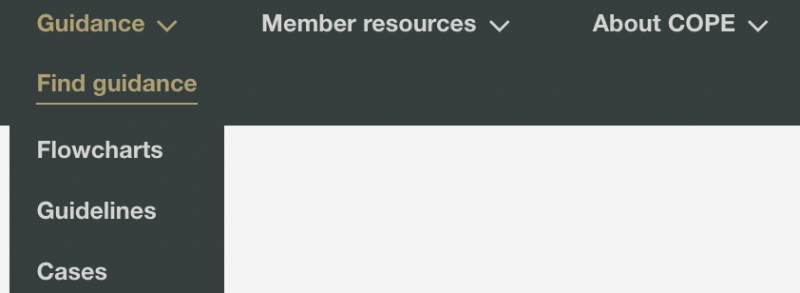The theme of Peer Review Week 2021 is “Identity in peer review”and will no doubt provide lots of opportunities to learn and share, as well as important food for thought about this fundamental aspect of scholarly publishing. COPE has lots of peer review resources to help you develop good peer review practices for your journal; to recognise when the peer review process may be going awry; as well as providing reviewers with guidance on good review practices. This article is meant to guide users to the peer review resources on the COPE website (publicationethics.org). The pages are tagged with the appropriate COPE Core Practice, of which Peer review processes is one.
Select “guidance” from the top menu.

To narrow your search by the type of guidance you want, filter by ‘resource type’. COPE produces a variety of resource types:
-
Guidelines
COPE Guidelines are formal COPE policy and are intended to advise editors and publishers on expected publication ethics practices. - Discussion documents
COPE discussion documents introduce issues and aim to stimulate discussion about a topic. They are often about complex issues and COPE welcomes comments which add to the ongoing debate. COPE discussion documents should not be considered formal COPE policy. Discussion documents may be revised but remain a discussion document as the issues develop and if further comment from the community is sought, or they may be revised to become formal COPE policy and published as COPE Guidelines. - Flowcharts
COPE flowcharts offer a step by step process, for practical use, on handling different aspects of publication ethics issues. Forum discussion summaries COPE introduces a topic for discussion at each Forum. The comments made by the Forum participants are summarised and posted on our website as a record of the discussion. - Cases
COPE Members can bring specific (anonymised) publication ethics issues to the COPE Forum for discussion and advice. The advice from the COPE Forum is specific to the particular case under consideration and may not necessarily be applicable to similar cases either past or future. The advice is given by the Forum participants: COPE Council and COPE Members from across all regions and disciplines.
When I selected “Peer Review Processes”" as the topic and selected Guidelines, Flowcharts, and Discussion Documents, I retrieved a useful list of peer review resources.
The COPE guidelines Ethical guidelines for peer reviewers is a COPE resource that reviews different types of peer review as well as providing important guidance to the reviewer about how to complete this important work. It is available in English, Chinese, and Spanish.
Of the 27 COPE flowcharts, six relate to peer review:
- Peer review manipulation suspected during the peer review process
- Peer review manipulation suspected after publication
- Systematic manipulation of the publication process
- How to recognise potential manipulation of the peer review process
- What to consider when asked to peer review a manuscript
- Reviewer suspected to have appropriated an author’s ideas or data
All 27 flowcharts are available in Arabic, Chinese, Croatian, Italian, Japanese, Polish, French, Spanish, and Turkish, while 14 are available in Persian.
There are six Forum discussion topics related to the COPE Core Practice “Peer Review Processes”:
- Coordinating multi-journal complaints
- Ethical considerations around book publishing
- Systematic manipulation of the publishing process via “paper mills”
- Editing of reviewer comments
- What does peer review mean in the arts, humanities and social sciences?
One discussion document and podcast:
There are 76 cases related to Peer Review Processes. If you are faced with a specific problem related to peer review, it is useful to look over the available cases, as another member may have asked for guidance from COPE on the same issue! Cases about the “Peer Review Process” submitted to COPE in 2019-2020 included Reviewer’s identify revealed; Sharing by a reviewer on social media; Reproducibility of methodology, Disputes arising from peer review of a rejected comment and published correction; and Reviewer requested addition of multiple citations of their own work.
The COPE website is rich with content related to peer review processes. Hopefully, this brief tour has pointed you towards interesting and useful information, and helped you to navigate the site for other content!
Nancy Chescheir, COPE Vice-Chair